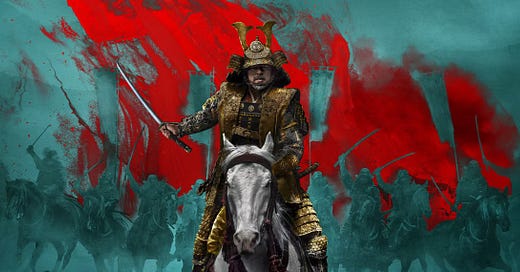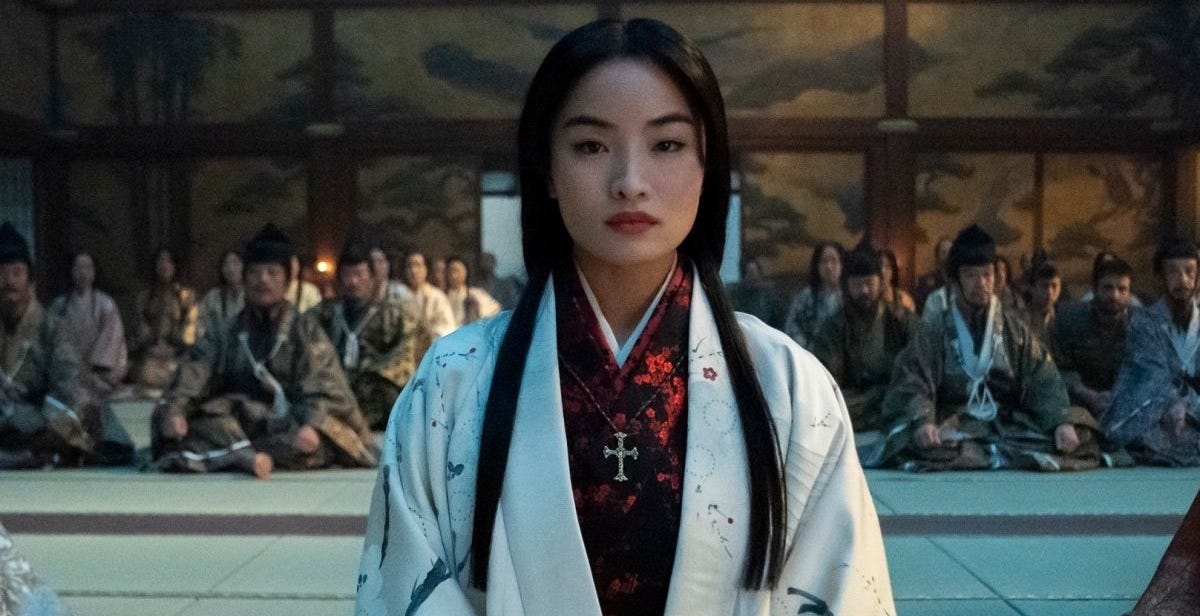“We live and we die. We control nothing beyond that.”
"Shogun" and the forgotten depth of simplicity.
This piece is by contributor Johan Pregmo. It contains some spoilers for the 2024 miniseries Shogun.
The last few decades have seen a number of unforgettable TV shows whose success went beyond good ratings and high viewership — series that ascended to the strata of cultural touchstones beloved by critics and audiences alike. Shows like The Sopranos (1999–2007), The Wire (2002–2008), The Office (2005–2013), Breaking Bad (2008–2013), and Mad Men (2007–2015) captured lightning in a bottle at just the right moment and became pop culture giants. But rumors of a modern golden age of television, sometimes called “peak TV”, have been greatly exaggerated.
Today’s media landscape is dominated by an increasing number of streaming services like Netflix, Disney+, or Amazon Prime Video, governed by the philosophy of quantity over quality, and convinced that bad writing, unlikeable characters, and cringeworthy virtue signaling can be papered over simply by throwing money at it. In chimp-like fashion, networks and platforms fling feces at the wall until something inevitably sticks — at which point they cancel it prematurely or milk it to the point of mediocrity. Good TV — truly good TV — the kind that gets you invested beyond I’m bored and need to kill time grows harder to find by the year, which is why FX’s Shogun (2024) has been such a breath of fresh air. Without doing anything particularly new or surprising, this historical miniseries finds astonishing complexity and drama in its simplicity.
Based on James Clavell’s 1975 novel of the same name, itself a fictionalized retelling of real events from feudal Japan, Shogun is an adaptation that is both traditional in the straightforwardness of its storytelling, and modern in its attention to historical detail. This isn’t the first Shogun adaptation, either. Clavell’s novel was originally made into a miniseries in 1980, one that went on to earn three Golden Globes, three Emmys, and another 11 Emmy nominations. This new Shogun had big sandals to fill, which it did — and then some.
First, a little historical context to set the stage. Like medieval Europe, Japan had a long period of feudalism defined by the constant bloody power struggles between aristocratic families. Then, in the 1560s, an ambitious dark horse warlord named Oda Nobunaga put Japan on a path toward unification through a series of ferocious wars. Although Nobunaga was killed before he could finish the process, his lieutenant, Toyotomi Hideyoshi, finally united Japan for the first time in 1590. After Hideyoshi’s death, a civil war ensued that saw the influential Tokugawa Ieyasu become the Shogun of all Japan — effectively a military dictator ruling on the emperor’s behalf — beginning a period of unified rule that would last till the 1800s.
The Shogun novel and its miniseries adaptation are historical fiction, but their disguise is paper thin. The charismatic lord Yoshii Toranaga (played by Hiroyuki Sanada) is a stand-in for Tokugawa, while his chief rival, Ishido (Takehiro Hira), represents Tokugawa’s chief rival, Ishida Mitsunari. The show portrays a pivotal period of Japanese history, where hard-fought unification was at risk of falling apart, and the long legacy of feudalism threatened to reach out from the past and throw the country back into a gruesome cycle of violence.
Into this mix is thrown John Blackthorne (played by Cosmo Jarvis) — roughly based on the historical figure William Adams, the first Englishman to reach Japan. A naval navigator by trade, he washes onto Japanese shores in the year 1600, and is quickly sucked into the vicious politics of a feudal Japan on the brink of civil war. Blackthorne soon finds himself serving under Toranaga, and involved in a complicated relationship with his translator, a woman named Mariko (Anna Sawai).
One of five regents reigning in the name of the late Shogun’s child heir, Toranaga is cornered by the crafty lord Ishido and pushed to the precipice of losing not only political power, but his life. Amid this precarious situation, Portuguese Catholic missionaries have gained a foothold in the country, and have converted several of the regents. Blackthorne, a Protestant, is thrust into this fray as a wild card, and like a pebble starting a landslide, he affects a large causal chain that sets off the main conflict of the story.
Blackthorne is the perfect fish out of water. He’s brash, individualist, and prideful in a society where etiquette is everything and the slightest faux pas can spell death. Feudal Japanese culture is shown in all its obsessively ritualistic glory — a byzantine labyrinth of excessive formality, an honor culture so strict that offense is worth killing — or dying — for. But for all of his flaws, Blackthorne’s boldness, determination, and willingness to adapt to his alien surroundings gains him the respect of his new peers through shared adversity.
The series initially seemed like it would follow many of hackneyed narrative tropes common in television these days, with unnecessarily graphic violence, and the Portuguese accurately portrayed as predatory colonizers threatening Japanese sovereignty. But by the end of the first episode, Shogun relaxes back into a much more traditional mold. Despite the grippingly dramatic twists and turns, the story is uncomplicated. Virtually everything we see is the simple result of preceding events. The story holds few surprises, and yet I was glued to my screen. And I wasn’t alone. The show drew nine million views in its first six days alone.
Unlike so many modern films and shows, Shogun has no desperation to break new ground. It does not contort itself to grasp at some semblance of true originality, or abandon the fundamentals of storytelling in the endless pursuit of shocking the audience or showing them something they’ve never seen before. Shogun prizes execution over innovation, excellence over novelty, and dramatic elegance over sprawling intrigue.
In contrast to movies like The Last Samurai (2003), which romanticize samurai society as deeply honorable, Shogun reveals its more historically accurate underbelly. We see a samurai disembowel himself purely for speaking out of turn, a sailor being boiled alive to satisfy the urges of a sadistic feudal lord, and a gardener voluntarily kill himself after disobeying a minor order from his lord. An earthquake kills thousands and everyone just moves on without much pause. We see a culture of extreme intensity best captured in Dan Carlin’s repurposed aphorism, “The Japanese are just like everybody else — only more so.”*
Shogun’s depiction of the feudal Japanese backdrop is raw, brutal, and unflattering. Mariko tells Blackthorne, who is distraught by the senselessness of the carnage he sees, “We live and we die. We control nothing beyond that.” The viewer becomes so immersed in the story and setting that Mariko’s perspective makes perfect sense in context. The show respects the intellect of the audience by painting, without judgment, an in-depth portrait of a society wholly unfamiliar to us. This is what they believe, and this is why they believe it. Make of it what you will.
Similarly, Shogun breaks from previous tropes playing into old myths about the Japanese being unfamiliar with firearms, or samurai scoffing at muskets and preferring the sword. The show demonstrates a concerted effort to accurately portray the period it represents, from the ruthless honor culture to the feudal politics, all the way down to details like armor, hair styles, clothing, and even speech patterns. It’s a refreshing level of consideration for history seldom seen in period dramas.
Historical accuracy is nice, of course, but where Shogun truly shines is in its character writing, and specifically the ways in which it dodges the pitfalls of modern media. Mariko is fearless, extremely principled, willing to die for her cause without a second thought, and skilled with weapons. And yet we don’t get even the faintest whiff of the “girlboss” archetype from her. She doesn’t try to “out-man” or emasculate male characters. She doesn’t speak truth to power or smash the patriarchy. Set beside hollow cutouts like Captain Marvel (2019), She Hulk (2022), and the dreadfully revisionist Netflix “historical” docudrama Cleopatra (2023), we see a real woman with more strength than any superhero. Mariko’s antagonist is her childhood friend Lady Ochiba (played by Akiko Kobayashi). Mother to the child Heir, Ochiba wields considerable political influence and power over even the scheming lord Ishido, and skillfully plays the political game. In a manner true to history, the series shows women as capable, principled, and having agency within their system — without projecting 21st-century Ivy League sensibilities onto them.
Indeed, Shogun steered clear of identity politics altogether. There was no bizarre and inexplicable race-swapping, no disregard for source material in the name of political correctness, no burning need to be overly clever or “correct.” More impressively, the show had the discipline and grace to stay self-contained and not overstay its welcome. Shogun sticks to a single, 10-episode miniseries format, avoiding the inevitable problems that come with a prolonged story. How many shows have we all watched with outstanding first or second seasons that devolved into unwatchable drivel by season four or five? Holding to a shorter span leaves less room for things to go downhill. But most importantly, it doesn’t try anything narratively ambitious, nor is it trying to be brave and bold and challenge society — it just sticks to telling honest, relatable stories of human beings trapped in extraordinary situations beyond their control. There’s no moral to Shogun. “We live and we die.”
We see this moral grayness with the scheming, openly traitorous Yabushige (Tadanobu Asano), who is nevertheless perfectly willing to commit ritual suicide if honor calls for it. Likewise, we never get a clear sense of any side being more moral than the other. We like Toranaga because he’s charismatic, wise, cunning, and dignified. And honestly, his role couldn’t have been more perfectly cast. On purely aesthetic grounds, Hiroyuki Sanada’s face is a landscape of fascinatingly vulpine angles. The viewer begins rooting for him before he’s even uttered a word. But we’re never under the misapprehension that he’s a saint. Ultimately, there’s very little moral difference between Toranaga and his rival Ishido — both are feudal lords vying for power using every dirty trick in the book. Toranaga may be likable, but he sacrifices several people important to him to reach his goals. He does not do it lightly or callously — but when the chips are down, he’s ready and willing. It’s a situation that invites the viewer to think, rather than a narrative with a clear hero and villain.
What’s interesting about Shogun is not just the sharp cultural contrasts of the brutal, hierarchical society of feudal Japan, but also the presence of cultural universals. When John has a drink-off with Buntaro (Shinnosuke Abe), Mariko’s demanding and cruel husband, it has a sort of timeless masculine energy to it — two men competing in the kind of petty pissing contest that apparently knows no cultural boundaries. Likewise, there’s something broadly familiar in Toranaga’s son Nagakado (Yuki Kura), a brash teenager overzealously trying to prove his manhood by talking big and posturing about honor, all the while coming across as entirely fake. Whether you live in modern society or feudal Japan, teenage boys are still poseurs trying on shoes three times too big and pretending they fit.
Shogun is not without its shortcomings. The second half has pacing issues, and the central character John Blackthorne seems to disappear for stretches. The show gets a little too dark in parts, and viewers could be forgiven for wishing there was slightly more action. The ending, faithful to the novel, leaves events somewhat unsatisfyingly unresolved, rendering the story a sort of slice of life of 1600 Japan. But the series is nevertheless made with a sincerity and passion for the craft that has become all too rare.
Shogun proves something that much of modern media seems to have forgotten: money alone cannot make a good story — it takes competence, vision, and above all else, good writing. By simply sticking to what works without trying to reinvent the wheel, and by finding complexity in simplicity through the lens of character relationships, Shogun transcends the overly grisly, gory, grimdark “realism” of shows like Game of Thrones (2011–2019). I didn’t expect to find in it one of the best historical adaptations I’ve ever seen, but Shogun turned out to be a pleasant surprise. TV producers should take note.
See also: “Stealth Editing a Culture”
Subscribe now and never miss a new post. You can also support the work on Patreon. Please consider sharing this article on your social networks, and hit the like button so more people can discover it. You can reach me at @AmericnDreaming on Twitter, or at AmericanDreaming08@Gmail.com.









Absolutely loved it! Spot on analysis. Highly recommend "Shogun"!
Gosh, you all are real desperate for something to call good. I understand, it's bad out there. But this?
>The show demonstrates a concerted effort to accurately portray the period it represents,
You know what would be a real effort? Portraying the actual history.
What we have here is not "more-perfect-than-life" embellished history like King Lear - rather, it's cowardly "history with the names changed." The sole purpose of this maneuver is to free the writer from burden of actual fidelity to history while still drawing "inspiration" from it. It's like Bob Dylan music - an old song with some of the words changed, which makes those unfamiliar with the source material think you're being original.
>What’s interesting about Shogun is not just the sharp cultural contrasts of the brutal, hierarchical society of feudal Japan, but also the presence of cultural universals.
Cultural universals? Null hypothesis should be that the white guy writer put white guy things in his Japan-themed book. That's not "a bad thing" but it is the furthest thing from an indication of a "cultural universal." Nice job making the "identity" people right about something. That's hard to do but you've managed to manage it. Did you know that the people who actually lived in this period wrote books too, and you can read them?
Game of Thrones is self-avowed schlock, which is a cut much above this sort of thing -- complete and utter schlock that utterly lifeless, utterly miseducated adult men take as suuuper meaningful and serious. This might be crossing the line, but I bet you like Cormac McCarthy.